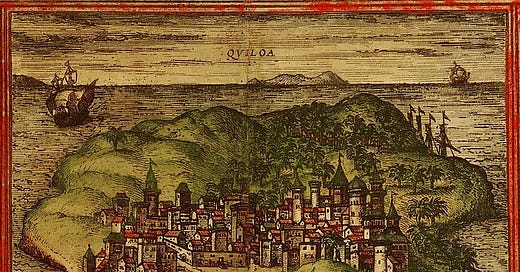Image of the Day

Spotlight Stories
Green is the New Black: Africa's Venture Capital Scene Gets an Eco-Friendly Makeover

While the rest of the world's venture capitalists have been hiding under their desks, clutching their wallets in fear, Africa's startup scene has been relatively unfazed by the global funding slowdown. Sure, deal values peaked in 2022 at $6.5 billion and then fell to $4.5 billion in 2023, but hey, that's still better than the nosedive the rest of the world took…
The difference is… Africa's startup scene is going green: 43% of venture capital activity is now focused on eco-friendly investments.
What's behind this sudden surge in green enthusiasm?
For starters, development finance institutions have decided to prioritize the climate crisis, launching their own funds and making it rain (sustainably, of course) for African startups.
So listen up, eco-warriors and money-minded millennials! If you've been looking for a way to save the planet and fatten your wallet at the same time, boy, do we have news for you.
Moving forward, sub-Saharan Africa will be the hottest ticket in renewable energy:
A new study by Wood Mackenzie Ltd. has uncovered a mind-boggling $193 billion investment opportunity in renewable energy and transmission by 2031. And get this - the returns are projected to be multiple times higher than in Europe and the US.

We're talking about internal rates of return between 15% and 21% for utility-scale wind, solar, storage, and transmission projects. Compare that to the measly 5% you'd get in the US and Europe.
Africa is the ultimate fixer-upper in the energy world. With about 600 million people (that's half the population!) without access to electricity, it's a massive problem... and an even bigger opportunity.
The Nitty-Gritty Details:
- National and micro-grids need $66 billion.
- Expect 11,000 kilometers of new transmission lines annually by 2031.
- South Africa, Nigeria, and Kenya are the solar power hotspots.
- Uganda is the dark horse, offering the best returns on renewable energy projects.
The researchers behind this study wrote, "Africa represents a significantly underserved market." Translation: It's like finding an untapped oil well, except it's green, sustainable, and won't make you feel guilty at your next climate change protest!
They also noted, "Renewable-energy assets across the region also tend to be at earlier stages of development, offering growth upside." In other words, it's like getting in on the ground floor of the next big tech startup, but instead of apps, you're investing in the future of an entire continent!
So, if you're looking to make some green while going green, Africa might just be your next big move. It's not just an investment opportunity; it's a chance to light up a continent, save the planet, and maybe, just maybe, finally impress your environmentalist ex!
Remember: In the race to renewable energy dominance, Africa isn't just a player - it's sprinting ahead with a $193 billion energy drink in hand.
Sudan's Dam Disaster: The Tragedy That's Sweeping the Nation

At least 60 people have lost their lives after a dam burst in war-torn Sudan. The culprit? Heavy rainfall that proved too much for the Arbat dam to handle.
Search operations are underway, but there are fears that the death toll could climb even higher. The dam, with a capacity of 25 million cubic metres, was the main source of drinking water for the coastal city of Port Sudan, where the military government is based.
As if a 16-month civil war wasn't enough, Sudan is now grappling with torrential rains and floods that have killed dozens and forced tens of thousands from their homes. The collapse of the dam in Red Sea state is one of the worst incidents, washing away farms and villages downstream.
The heavy rainfall has also damaged a major fibre-optic cable in Sudan, causing a communication outage in many parts of the country for the second day in a row.
Sudan has been ravaged by war since last April when fighting broke out between the paramilitary group the Rapid Support Forces (RSF) and the Sudanese army. Millions of people have been forced from their homes and multiple states have declared famine.
Mpox Vaccines in Africa: A Case of "Better Late Than Never"?
Well, well, well. It looks like the mpox vaccines are finally making their fashionably late entrance in Africa, where a dangerous new strain of the virus has been wreaking havoc.
You'd think that after the whole COVID-19 fiasco, the world would have learned a thing or two about global healthcare inequities. But apparently, old habits die hard.
The illness has claimed more than 575 lives and counting in the DRC, the epicenter of the current crisis, and the outbreak — which public health officials say was avoidable — has snowballed, with missteps, red tape and inaction. The virus is now detected in over 9 countries.
It took the World Health Organization (WHO) until this month to start the process of giving poor countries easy access to large quantities of the vaccine. Talk about a slow-motion replay!
African governments and the Africa Centres for Disease Control and Prevention (CDC) have been left to beg for vaccine donations from rich countries.
Meanwhile, countries outside Africa have been living it up with their mpox shots, with the U.S. alone vaccinating 1.2 million people.
The WHO's role in approving medical products has been a game-changer for low-income countries, but it's also been criticized for being slower than a snail on a leisurely stroll.
For more on this, check out Reuters’ report.
Food for Thought
“Don’t ask the price if you don’t have money to pay.”
— Malagasy Proverb, Madagascar





Suggestion: Have you considered acting as something of a clearinghouse for entrepreneurs looking to raise capital? A lot of people would like exposure to those deals, even though they're risky...